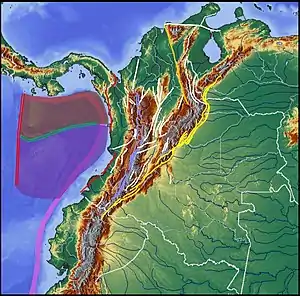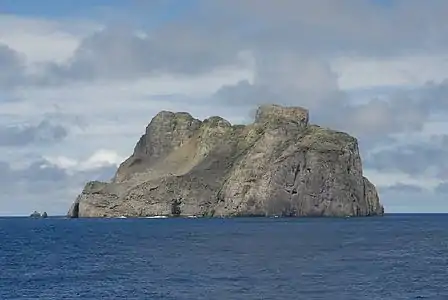Malpelo Plate
The Malpelo Plate is a small tectonic plate (microplate) located off the coasts west of Ecuador and Colombia. It is the 57th plate to be identified. It is named after Malpelo Island, the only emerged part of the plate. It is bounded on the west by the Cocos Plate, on the south by the Nazca Plate, on the east by the North Andes Plate, and on the north by the Coiba Plate, separated by the Coiba Transform Fault (CTF). This microplate was previously assumed to be part of the Nazca Plate. The Malpelo Plate borders three major faults of Pacific Colombia, the north to south striking Bahía Solano Fault in the north and the Naya-Micay and Remolino-El Charco Faults in the south.
| Malpelo Plate | |
|---|---|
 Malpelo Plate in purple, Coiba Plate in dark red PTF in red, CTF in green | |
| Type | Micro |
| Coordinates | 03°14′N 81°14′W |
| Movement1 | East |
| Features | Bordering: Coiba Plate (north) North Andes Plate (east) Nazca Plate (south) Cocos Plate (west) Basins: Chocó Offshore Basin Colombian Deep Pacific Basin |
| 1Relative to the African Plate | |
Description
The Malpelo Plate was identified by a non-closure of the Nazca-Cocos-Pacific plate motion circuit, reported by Tuo Zhang and lead-researcher Richard G. Gordon et al. of Rice University in a paper published in August 2017.[1] The existence of the plate has been hypothesised before.[2] The formation of the oceanic crust of the plate has been estimated to be since the Middle Miocene (14.7 Ma).[3]
The researchers used a Columbia University database of multibeam sonar soundings west of Ecuador and Colombia to identify a diffuse plate boundary that runs from the Panama Transform Fault (PTF) eastward to where the boundary intersects a deep oceanic trench just offshore of the South American coast, north of the Galapagos Islands.[1]
Gallery
 Former plate boundaries in the Pacific, offshore western South America
Former plate boundaries in the Pacific, offshore western South America Seismic activity map of Colombia
Seismic activity map of Colombia Map of Malpelo Island, namesake of the plate
Map of Malpelo Island, namesake of the plate Malpelo Island, the only emerged section of the plate
Malpelo Island, the only emerged section of the plate
References
- Zhang et al., 2017
- Herrera Cala, 2013, p.69
- Meschede & Barckhausen, 2000, p.4
Bibliography
- Herrera Cala, Francys Daniela. 2013. Correlación de eventos sísmicos con la temperatura ambiental, en el área metropolitana de Bucaramanga, 1–167. Universidad Pontificia Bolivariana. Accessed 2017-09-01.
- Meschede, Martin, and Udo Barckhausen. 2000. Plate tectonic evolution of the Cocos-Nazca spreading center. Proceedings of the Ocean Drilling Program, Scientific Results 170. 1–10. Accessed 2017-09-01.
- Zhang, Tuo; Richard G. Gordon; Jay K. Mishra, and Chengzu Wang. 2017. The Malpelo Plate Hypothesis and implications for nonclosure of the Cocos-Nazca-Pacific plate motion circuit. Geophysical Research Letters 44. 1–6. Accessed 2017-09-01.
Further reading
- Lonsdale, Peter, and Daniel Fornari. 1980. Submarine geology of Malpelo Ridge, Panama Basin. Marine Geology 36. 65–83.
- Marcaillou, Boris; Philippe Carvis, and Jean-Yves Collot. 2006. Structure of the Malpelo Ridge (Colombia) from seismic and gravity modelling. Marine Geophysical Research 27. 289–300. Accessed 2017-09-01.
- Patarroyo Camargo, Germán David, and José Ignacio Martínez Rodríguez. 2013. Foraminíferos bentónicos recientes en las aguas profundas de la Cuenca de Panamá: ecología y su posible relación con las corrientes de fondo. Boletín de Investigaciones Marinas y Costeras 42. 31–55. Accessed 2017-09-01.
- Sallarès, Valentí; Philippe Charvis; Ernst R. Flueh, and Joerg Bialas. 2003. Seismic structure of Cocos and Malpelo Volcanic Ridges and implications for hot spot-ridge interaction. Journal of Geophysical Research 108. 1–21. Accessed 2017-09-01.

